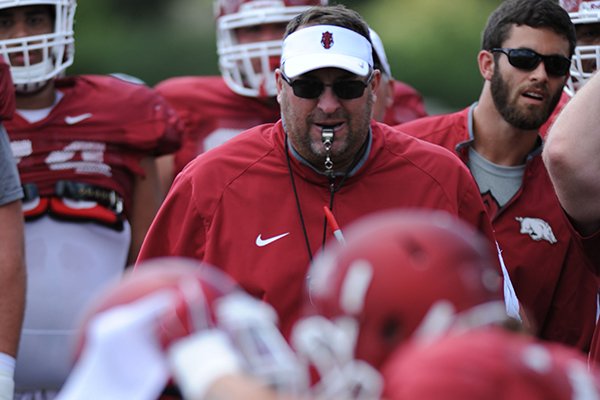FAYETTEVILLE — When it comes to offensive philosophies, Bret Bielema and Dana Holgorsen are on almost entirely different ends of the spectrum.
Arkansas’ coach, of course, gears his teams toward a physically punishing, run-first style meant to bleed clock. Meanwhile Holgorsen, West Virginia’s head coach, is one of the nation’s foremost proponents of a pass-first, “Airraid” spread offense designed to blitz defenses into oblivion.
When it comes to player health, though, Bielema and Holgorsen appear to be on the same page. Four years ago, Holgorsen’s Mountaineers might have been the first major college football program to entirely do away with the decades-old training camp practice of “two-a-days,” which involve two full-contact practices in a single day. Then, last month, Bielema’s Razorbacks became one of the first SEC programs - if not the first - to do the same.
Both coaches are at the forefront of a nationwide trend emphasizing less contact in fall camps. Mississippi State and Alabama, for instance, scheduled three two-a-days in August. Georgia scheduled two such practices, while Auburn scheduled one.
By and large, the other SEC teams - like Arkansas - opted for less physically demanding walk throughs, film study and individual training sessions in lieu of the extra full-contact practices.
“It gives you recovery time, especially in intense heat,” Auburn team doctor Mike Goodlett told 247Sports’ Phillip Marshall. “It gives you time to get the fluids back and to physically and mentally recover.”
That recovery is increasingly important for seasons that have only been getting longer for major college players since the NCAA approved a 12th regular-season game in 2005. The addition of more bowl games, more conference championship games and the College Football Playoffs - combined with fewer FCS opponents - mean that on the whole starting players are playing more and sustaining more hits than ever. That’s why more coaches are trying to save their players from hitting on the front end of the season by taking away two-a-days.
"We play against each other every day in practice and hopefully are competing against one of the best offenses and defenses every day,” Bielema told ESPN in July. “We want that [2015] season to be special. We've got to make sure we're fresh when we get there."
It’s too early to tell how this extra rest will pay off for a No. 18 Arkansas team which faces what may be the nation’s toughest schedule in one of the deepest divisions in the history of the game. Its only known precedent is along these lines is West Virginia, which has faded in the latter halves of the past three seasons.
After a strong 2011 finish, the Mountaineers lost six of their final eight games in 2012; six of their final seven games in 2013 and three of four final games in 2014.
Still, a strong finish for the Hogs this season would likely put them squarely in contention for an SEC title and bring Bielema’s training philosophy back into the national limelight. In that case, would other programs likely emulate Arkansas in scrapping the two-a-day?
“They may,” quarterback Brandon Allen said in early August. “We’ll see how it works out. It’s really just for keeping us fresh for the start of the season and throughout the season.”
Some head coaches have already given signs they would seriously consider dropping the two-a-day in coming years. Georgia’s Mark Richt, for instance, last month told Macon.com he “could live without” them. “I do like the recovery time, I like the film time, I like being thorough as a teacher. I like getting some lifting during that time.”
Barry Lunney, Jr., the Hogs’ tight ends coach, said this mindset is part of an evolution away from a past that involved relatively out-of-shape players at the tail end of summer breaks. But the need for “a true old-school two-a-day grind” dissipated as players tended to stay longer on campus during the summer. Then, last year, for the first time coaches were allowed to mandate their players spend eight hours a week on conditioning, weight training, and film study during the summer. As such, major college football is essentially a year-round sport.
Given these larger trends at play, Lunney believes it’s unlikely how Arkansas performs will have much of a bearing on what other programs do in future fall camps and how many of their allotted four two-a-days - if any - they will use. There is, after all, no guarantee Bielema won’t see the need to bring them back in future years.
“At the end of the day, we’ve still got to block and tackle and play well and take care of the ball,” Lunney, Jr. said.
Not all SEC head coaches share Bielema and Holgersen’s mindset.
Tennessee’s Butch Jones, for instance, believes the grind of full-contact two-a-days are essential building blocks to the character of his team. The Volunteers’ athletic department released a video stating “the grit and grind of Tennessee’s two-a-days are crucial come game time.”
On the department’s Website, Jones praised two-a-days as a vital part of camp. "This is where your team is really born - when you grind through training camp and suffer through adversity and persevere.”
Jones’ sentiment was echoed by a few NFL players in 2011 when two-a-days were part of collective bargaining agreement negotiations.
“Two a days, it’s what football is all about,” former New York Jet linebacker Bart Scott told NFL.com. “It’s about endurance, pain, will, putting yourself through something when your body is telling you it doesn’t want to go.”
He add that a future without this tradition would be “wimping out, making football soft.”
Former Democrat-Gazette reporter Evin Demirel runs Arkansas’ first roundup of sports radio and TV interviews through his new site BestofArkansasSports.com. Find out more out the free e-mail newsletter here.

